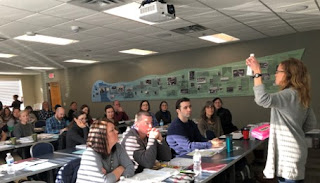-Annalisa Hultberg, Extension Educator food safety
Food safety is a critical part of all produce farm operations, and recent outbreaks in Listeria monocytogenes in bagged salad greens from Dole and Fresh Express continue to make headlines, and continue to send consumers to the hospital. While these large, multi-state outbreaks make the headlines because the number of consumers sickened, there is evidence that the vast majority of foodborne illnesses go unreported.
Foodborne illnesses related to fresh produce are not only bad for the sickened consumers and their families, they can be detrimental to a farm's reputation and future. One of the best ways to protect your customers and your business from being involved in a foodborne illness outbreak is to maintain good food safety practices on your farm and keep basic food safety records. Learning about Good Agricultural Practices and current food safety laws are a great way to build your farm's plan for preventing foodborne illness from spreading from food that you grow and sell. One great way to do that is to attend a FSMA training course.
Who should attend?
If your farm is fully covered by the Food Safety Modernization Act (FSMA) Produce Safety Rule, at least one supervisor or responsible party from your farm must attend a training course that uses FDA-approved curriculum (read more here to learn whether or not your farm is fully covered by the Produce Safety Rule). This course meets the training requirement.
While this course is mandatory for farms covered by the Produce Safety Rule, all growers interested in learning about produce safety, Good Agricultural Practices (GAPs) and the FSMA Produce Safety Rule are encouraged to attend. Learning about and implementing produce safety practices can protect your farm and business, can help you get a GAP audit if needed, and helps keep our local food safe and healthy for all. The course covers best practices over broad range of produce safety topic areas, including worker health and hygiene, crop inputs (soil amendments), domestic and wild animals, water use and testing for pre- and post-harvest operations, such as irrigation and washing.
Dates and Registration
- Feb 12 and 19, 2022: (SPANISH/ español): Online: 9:00am – 1:30pm
- Feb 22: Online: 8:45am - 5:00pm
- Mar 16 and 17: Online: 8:45am - 1:00pm
- Apr 8: In-person, Maple Grove Community Center: 8:45am - 5:00pm (lunch included)
Cost: $25. Includes training materials (mailed in advance for virtual training) and a certificate of course attendance.
Register: www.mda.state.mn.us/fsmatraining
Who leads the course?
These dynamic courses will be co-led by trained fruit and vegetable farmers, staff from UMN Extension and the Minnesota Department of Agriculture Produce Safety Program.
Participants are eligible to receive a certificate of completion issued by the Association of Food and Drug Officials (AFDO). The AFDO certificate is valid for life.



Comments
Post a Comment